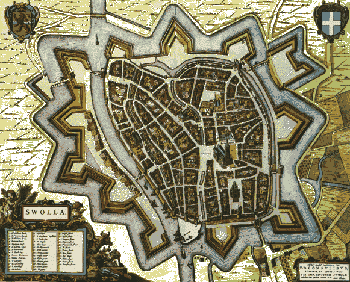|
|
| The
name "ten Thij" belongs to an old Saxon family of which |
| the
first records date back to August 31rst of the year 1230. |
|
| On that very date
Willibrand, the Bishop of
Trajectum (Utrecht in |
| the Netherlands), declared that he has granted city-rights
in the |
| presence of the
war-lords to the inhabitants of the village Suolle |
| (Zwolle) for their contribution in the battle against the Drenthones |
| (German
tribes from the northern part of the present Netherlands). |
| Amongst these
war-lords was mentioned, being a co-signer of this |
| document, a knight called
Nycolaus ten Thij. |
|
| The inhabitants of Zwolle were also
granted these
rights, by which |
| they could build city-walls and canals, and enjoy a certain |
| freedom, for their financial contribution to help build the castle
of |
| Hardenborg. |
|
| The document is one of many
that reveal the
gaining influence in
|
| the Netherlands of the local gentry and the people in the
cities, a
|
| tendency that marked the era.
|
|
|
 |
| The results of these city- rights to
build |
| walls and canals are still well |
| represented in an old map of this
city in |
| the seventeenth century by Ioan Blaeu |
| (23.09.1596 - 28.12.1673). |
| |
| (N.B. meant to
be presented are not the |
| later built fortifications, but
of course the |
| older city-structures). |
| |
| |
 |
| [
next page
| back to index
] |
|